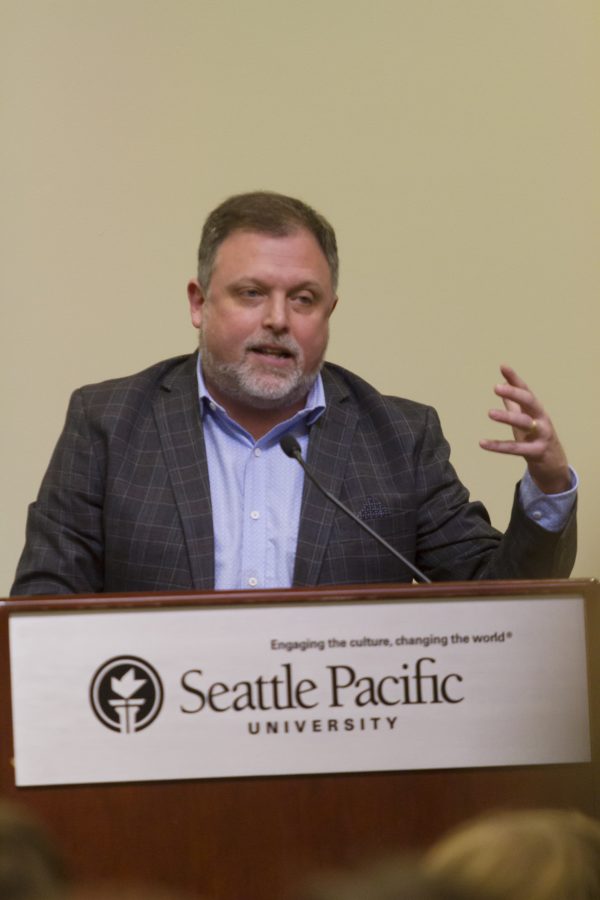Tim Wise sheds light on politics of social divides
The audience laughs as anti-racism activist Tim Wise cracks yet another cynical jab at the politics of the United States of America.
Wise, 50, talks about an email he got from an angry individual who was enraged about how African and Mexican Americans are stealing “his job.” Wise’s response to both the individual and the many white Americans who hold that same ideology is simple:
“When people say you took my job, my question for you is this: did you have the job yet?” Wise paused. “Because if you didn’t have it, it was not yours.”
The fear that is reflected in this individual and in many conservative Americans is what Wise argues perpetuates racism, sexism and classism in the U.S. According to him, the only way to fix that is to change how white Americans live their lives: through humility and love.
This is only further seen through Wise’s own background and how he decided to pursue a career of activism.
It all started with two events completely out of his control: failing during baseball tryouts in high school and joining the debate club for a girl. From there, he would go on to follow the same girl by attending Tulane University, where the seeds of a successful career in activism would be sowed.
Through getting involved at Tulane, Wise befriended many people who would prove to essential to his future path. Some of these included friends who were at the time fighting against the campaign of David Duke, a known white supremacist and former Grand Wizard of the Klu Klux Klan.
Through his activism working against David Duke’s campaign, he was publicized speaking up against racism, which led to many opportunities that simply would have not been possible if it wasn’t for the connections he made at Tulane.
This is only further exemplified by his comments on how the American ideal does not benefit everyone in society: in fact, for people of color, it can be the very instrument of oppression.
“We all know that it’s not as simple as, ‘Wherever you end up is all about your efforts.’ We all know that. We all know it. But we want to believe it, don’t we, because it makes us feel that we are the captains of our ship,” Wise said.
This fact seems to only be reinforced by the personal stories of some students at Seattle Pacific University.
President of the Social Justice committee and junior social justice and cultural studies major Andy Spalletta described their own struggles being a latinx individual stuck between her identity with her latinx family on one side and her white family on the other side.
“I saw from very young that there were certain members of my family that were able to get a lot of opportunities and other members being treated very negatively by a lot of people in the same community,” Spalletta said.
According to Spalletta, SPU students can take Wise’s message and use it as a way to get themselves to participate in conversations relating to racial injustices.
Another student, second-year Sophie Hamann, a social justice and sociology major, emphasized the importance of practicing reconciliation and how by including people of color in conversations about social injustices America can begin to improve.
While reconciliation is an important part of SPU’s mission, there are still many in America who seek to dwell in the past and see the potential for people of color to excel in our society to be dangerous opposition to those in power.
Hamann stated, “I think reconciliation is working towards understanding where we went wrong and where we are still going wrong and working towards getting people, especially people of color, to bring the power to them and away from the privileged.”
This related to an encounter Wise described with a man who he described as his “nazi pen pal.” This man contacted Wise, practically screaming at him through an email.
Rather than meet this anger with more anger, Wise did something that proved far more effective. He treated this man with compassion by being interested in having a conversation about his views.
“At the very least, what happens when you ask that person a question about why they think what they think a couple of things happen. Number one, you are showing respect for them, you’re demonstrating compassion and respect and showing interest in them, which in itself is a nice thing to do and distressed the situation,” Wise suggested.
In doing this, Wise may have not been able to change this man’s views, but still has become a less dangerous individual who is no longer as much of a threat to reconciliation. Wise argues this came from a stance of compassion.
This approach to creating a political environment that allows our society to traverse political fear reflects how the future requires one to focus more on the needs of the whole than the needs of the few.
“If we keep holding on to the idea that we have earned everything we have, by God, and we don’t want to share it with anyone, because we think it’s all about us, we’ll never build a society of plenty for everyone,” Wise said.
Wise argues that Americans must give up the notion of, “Wherever you end up is all about your efforts.”
“We don’t need to make America great again,” he said. “We need to make America great for the first time, and we will only do that on the basis of truth and humility and honesty.”

















































































